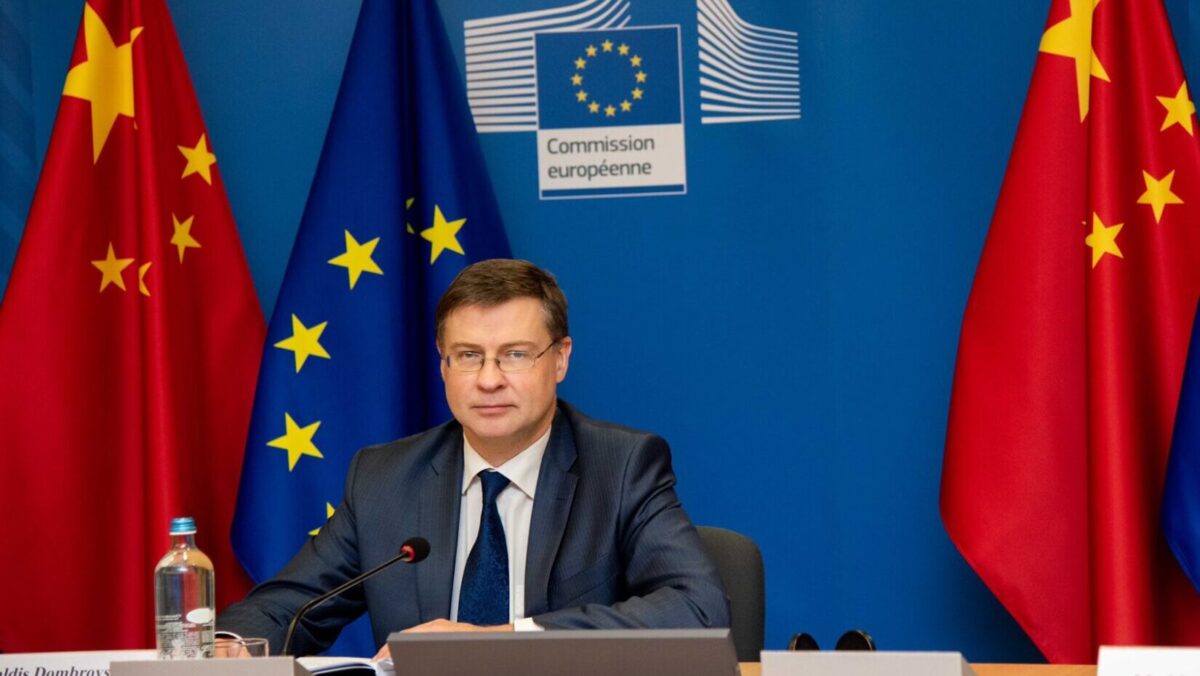
Valdis Dombrovskis during discussions with Chinese Vice-Premier Liu He on the EU-China Comprehensive Agreement of Investment in 2020.
The EU will reconsider its economically liberal attitude towards Chinese imports after the bloc’s annual trade deficit with Beijing ballooned to €400 billion last year, a figure that even some EU officials have publicly admitted is “staggering.”
The EU now runs a bigger (goods) deficit with China than the US — and that deficit surged in the last few years.
— Brad Setser (@Brad_Setser) August 7, 2023
2/ pic.twitter.com/EGNKB3rs3C
EU trade commissioner Valdis Dombrovskis will address the issue directly in talks with Chinese officials in September as part of a trade dialogue, with the policy shift coming amid a general rethink of EU-China relations. In comments to the Financial Times, Dombrovskis said,
The China-EU trading relationship is very unbalanced. China is running a huge trade surplus. And the level of openness from the Chinese side is not the same as the level of openness from the EU side.
The Latvian-born Dombrovskis blamed the deficit spike specifically on divergent outlooks on tariffs where China historically favoured strategic protectionism, compared to the generally more free-trading EU.
Dombrovskis also raised the possibility of the European Commission launching “ex officio” trade investigations into the existence of cartel-like behaviour by Chinese companies, as he warned that protectionism was giving China an unfair advantage.
Following the lead of the United States, the EU has moved to buttress its economy against over-dependence on the Chinese market with legislative measures rushed through the European Parliament to introduce strategic tariffs on raw materials and green tech in a policy Commission President Ursula von der Leyen has labelled “derisking.”
NOW – EU's von der Leyen: "We know this is an era where we rely on one single supplier. China. 98% of our rare earth supply." pic.twitter.com/Kbs5cjOTmG
— Disclose.tv (@disclosetv) March 30, 2023
Despite coarsening diplomatic relations following the pandemic, Chinese imports to the EU soared from €385 billion in 2020 to €626 billion in 2022 according to official statistics, as Europe finds itself increasingly reliant on Chinese manufacturing and raw materials to facilitate its ‘green transition.’
In response to this imbalance, the EU will now consider rolling out additional export tariffs, as well as taking up the issue with the WTO as many fear that the horse has already bolted when it comes to challenging inordinate Chinese control over the European economy.
The economic rise of China has always been linked to disparate trading policies from Beijing with the EU gradually moving away from its traditional embrace of free trade to combat rising security threats from Russia and increasingly now China.
Member states are still split on the question of decoupling from China as diplomats lamented that the EU was sycophantically following the United States toward a confrontation with Beijing against its own best interests. France and Hungary have become the primary voice of opposition to decoupling from China as French Finance Minister Bruno Le Maire declared that severing economic ties with Beijing was next to impossible in the current circumstances.
During a visit to #Beijing, #French #Finance Minister Le Maire praised #China as being 'way ahead of many other countries' in areas like #green transportation. He also said that #economic '#decoupling' from China was impossible. 🇨🇳🇫🇷pic.twitter.com/IaCTnKwvWy
— Mission of China to the EU (@ChinaEUMission) July 31, 2023
Trade considerations forced EU Commission officials to pour cold water on recognising Taiwan at a committee hearing of the European Parliament last month as the first new EU sanctions against China were imposed in June on companies allegedly violating weapons restrictions against Russia.
Following what appears to be a palace coup in the Chinese Foreign Affairs Ministry, Josep Borrell will travel to Beijing to attempt to diffuse tensions between Europe and China as many feel that Europe is running out of time to set an independent line on its future relations towards China.
